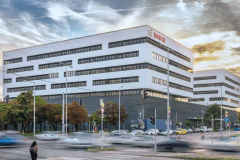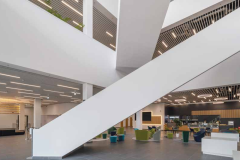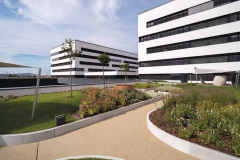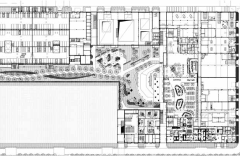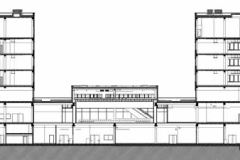A Laboratory in the Park
Bosch Budapest Innovation Campus
Architect: Marina Annus
Text: Péter Debreczeni
Photos: Tamás Bujnovszky
Bosch Innovation Campus is a building complex that seeks to integrate harmoniously into its surroundings, and although it incorporates all the design principles of contemporary office architecture, from communal design to highly automated office spaces and energy-saving solutions, its main asset is its installation itself as well as its open, engaging relationship with the city surrounding it. It is located in a neglected part of Budapest, which has been developed in recent years though, on the northern side of the Kőbánya-Kispest intermodal hub, as a „counterweight” to the shopping centre. The building complex is a genuine campus in terms of its layout and orientation, with green public spaces dividing the rather large, multi-functional building ensemble. As it is a centre for the development of automotive technology, in addition to the office functions, the company’s main and most valuable assets are the instrumentation research and test laboratory, a special outdoor test track and test hall, as well as a pedestrian bridge, covering an area of approximately 14 000 square metre on a 90 000 square metre site. The office function in itself is a secondary one. In terms of dimensions and facilities, it ranks as one of the most extensive Bosch development centres in Europe. The building can be divided vertically into two units. The flat volume, which covers the entire site, houses the reception and circulation level, the test laboratories and parking zones that require higher ceilings, while the four-storey tower-like structures that grow out of it contain the offices and associated functions. The top of the shingle building has been landscaped and is easily accessible from the towers, essentially creating a second park of a more intimate nature. The most significant units are of course the test laboratories, but an important consideration in the design of the functional scheme was also to offer the staff rest and circulation areas of appropriate quality and dimensions.
General planning: CÉH Ltd.
Project leader: Attila Borbély
Leading architect: Marina Annus
Structure: Roland Ambrus
Electrical engineering: Attila Lénárt
HVAC: László Lukács
Fire protection: Orsolya Brindzsik
Bridge, framework: Alfonz Léhner
Environment: Krisztina Wallner
Elevator: László Lukács
Soil mechanics: Balázs Móczár
Public utilities: Mária Ibolya Gárdonyiné Kormos
Traffic: Péter Várnai

